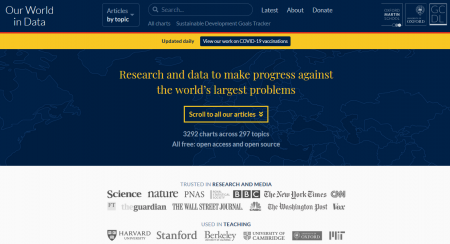Our World In Data

“Poverty, disease, hunger, climate change, war, existential risks, and inequality: The world faces many great and terrifying problems. It is these large problems that our work at Our World in Data focuses on.
Thanks to the work of thousands of researchers around the world who dedicate their lives to it, we often have a good understanding of how it is possible to make progress against the large problems we are facing. The world has the resources to do much better and reduce the suffering in the world.
We believe that a key reason why we fail to achieve the progress we are capable of is that we do not make enough use of this existing research and data: the important knowledge is often stored in inaccessible databases, locked away behind paywalls and buried under jargon in academic papers.
The goal of our work is to make the knowledge on the big problems accessible and understandable. As we say on our homepage, Our World in Data is about Research and data to make progress against the world’s largest problems.
A publication to see the large global problems and the powerful changes that reshape our world
If you want to contribute to a better future you need to know the problems the world faces. To understand these problems the daily news is not enough. The news media focuses on events and therefore largely fails to report the two aspects that Our World in Data focuses on: the large problems that continue to confront us for centuries or much longer and the long-lasting, forceful changes that gradually reshape our world.
The criterion by which the news select what they focus our attention on is whether it is new. The criterion by which we at Our World in Data decide what to focus our attention on is whether it is important.
The front page of Our World in Data lists the same big global problems every day, because they matter every day. One of the biggest mistakes that the news media makes is to suggest that different things matter on different days.
To understand issues that are affecting billions, we need data. We need to carefully measure what we care about and make the results accessible in an understandable and public platform. This allows everyone to see the state of the world today and track where we are making progress, and where we are falling behind. The publication we are building has this goal. Through interactive data visualizations we can see how the world has changed; by summarizing the scientific literature we can understand why.”
